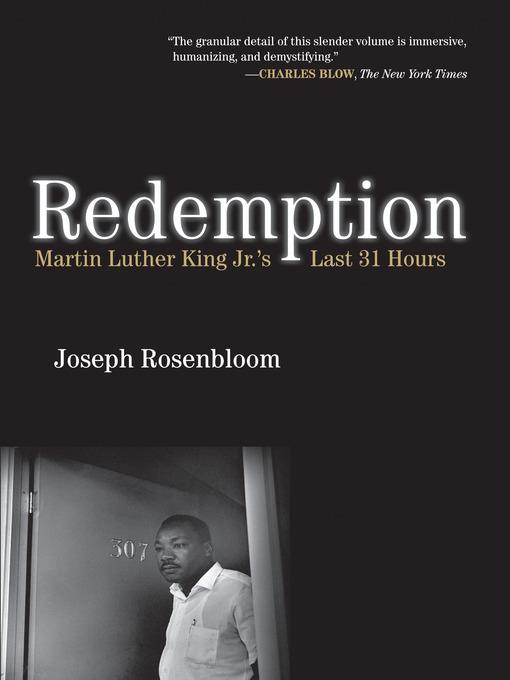
Redemption
Martin Luther King Jr.'s Last 31 Hours
کتاب های مرتبط
- اطلاعات
- نقد و بررسی
- دیدگاه کاربران
نقد و بررسی

January 1, 2018
By 1968, the civil rights movement led by Dr. Martin Luther King, Jr. (1929-68), faced fierce criticism. Emboldened segregationists attacked King at any opportunity. The Black Panthers, headed by Stokely Carmichael, urged more confrontational and violent actions to bring about change. King's vocal opposition to the Vietnam War and his shift in priorities to the Poor People's Campaign alienated some of his closest and longtime followers. For his own part, King's strenuous schedule of speeches and travel was exhausting. Amid this atmosphere, King was drawn to Memphis to advocate on behalf of garbage collectors who were going on strike. Journalist Rosenbloom, in his first book, chronicles the final 31 hours of King's life. Using memoirs, interviews, and newly released papers from the files of Coretta Scott King and William Rutherford, former director of the Southern Christian Leadership Conference, Rosenbloom paints a taut and detailed picture of King's and his assassin's movements in Memphis. This slim volume makes palpable the culminating strain and fatigue King experienced during that fateful trip. VERDICT The final hours of King's life come into sharp focus in this must-read for anyone interested in the life of the civil rights leader.--Chad E. Statler, Westlake Porter P.L., Westlake, OH
Copyright 2018 Library Journal, LLC Used with permission.

January 1, 2018
An encapsulation of the civil rights reformer's life through the lens of the 31 hours before his assassination in 1968.Investigative journalist Rosenbloom, formerly of the Boston Globe, Frontline, and Inc., reinforces the story of the end of Martin Luther King Jr.'s remarkable life with an integrated summary of the career that brought him finally to the Lorraine Motel in Memphis in spring 1968. The garbage collectors of Memphis, virtually all black, were on strike. Earlier in the city, rioting marred a march led by King, who was the president of the Southern Christian Leadership Conference at the time. Though the SCLC was in the midst of planning a Poor People's March in Washington, D.C., King, depressed and weary, felt compelled to return to Tennessee to lead another demonstration. The author details a pending injunction against King's participation and the negotiations with unreliable and demanding gang members recruited as likely marshals and a stubborn mayor. Rosenbloom also concisely describes the quotidian bonding of King and his diverse associates, and he doesn't ignore King's relationship with his wife, Coretta, as well as his extramarital adventures. The personality and moods--often dark, sometimes frolicsome--of the supremely gifted orator and preacher are a salient feature of the author's report. Also integral to the text are the late-afternoon activities of King's feckless murderer, James Earl Ray. The portrayal of Ray in his perch watching the civil rights leader at the Lorraine Motel is succinctly cinematic. The previous night was stormy as King spoke to a disappointingly small crowd, but his words were memorable. He mused on the possibility of a curtailed life, but, he said, he had "been to the mountain." He was only 39 when he died.A skillful depiction of the people and the scenes surrounding the killing of the champion of the civil rights movement.
COPYRIGHT(2018) Kirkus Reviews, ALL RIGHTS RESERVED.

Starred review from February 15, 2018
Martin Luther King Jr.'s final hours are given substance and relevance as only an investigative journalist like Rosenbloom can do. The pacing drives you to the well-established, heartbreaking end, while the journey leaves you with a greater appreciation of the forces carrying King forward. A determined but embattled leader, he struggled to control himself and a national movement, exhausted and rightly fearing for his own life even as he continued his life's work with religious zeal. Outside forces, including the FBI, local authorities, and James Earl Ray, are seen tracking King's movements for their own purposes. Through eyewitness anecdotes and historical documents, Rosenbloom rolls back the familiar time line and weaves intimate details into the larger context of King's trip to Memphis to support the city's sanitation workers, whose strike personified the struggle for economic justice, the next focus for the civil-rights movement. King had also returned to Memphis to renew his commitment to nonviolence after a riot the previous month and in light of the rise of the Black Power movement. Redemption portrays a complex and challenging man whose legacy of visionary and courageous eloquence and action still offers hope for a more inclusive and peaceful America 50 years after his assassination.(Reprinted with permission of Booklist, copyright 2018, American Library Association.)

























دیدگاه کاربران